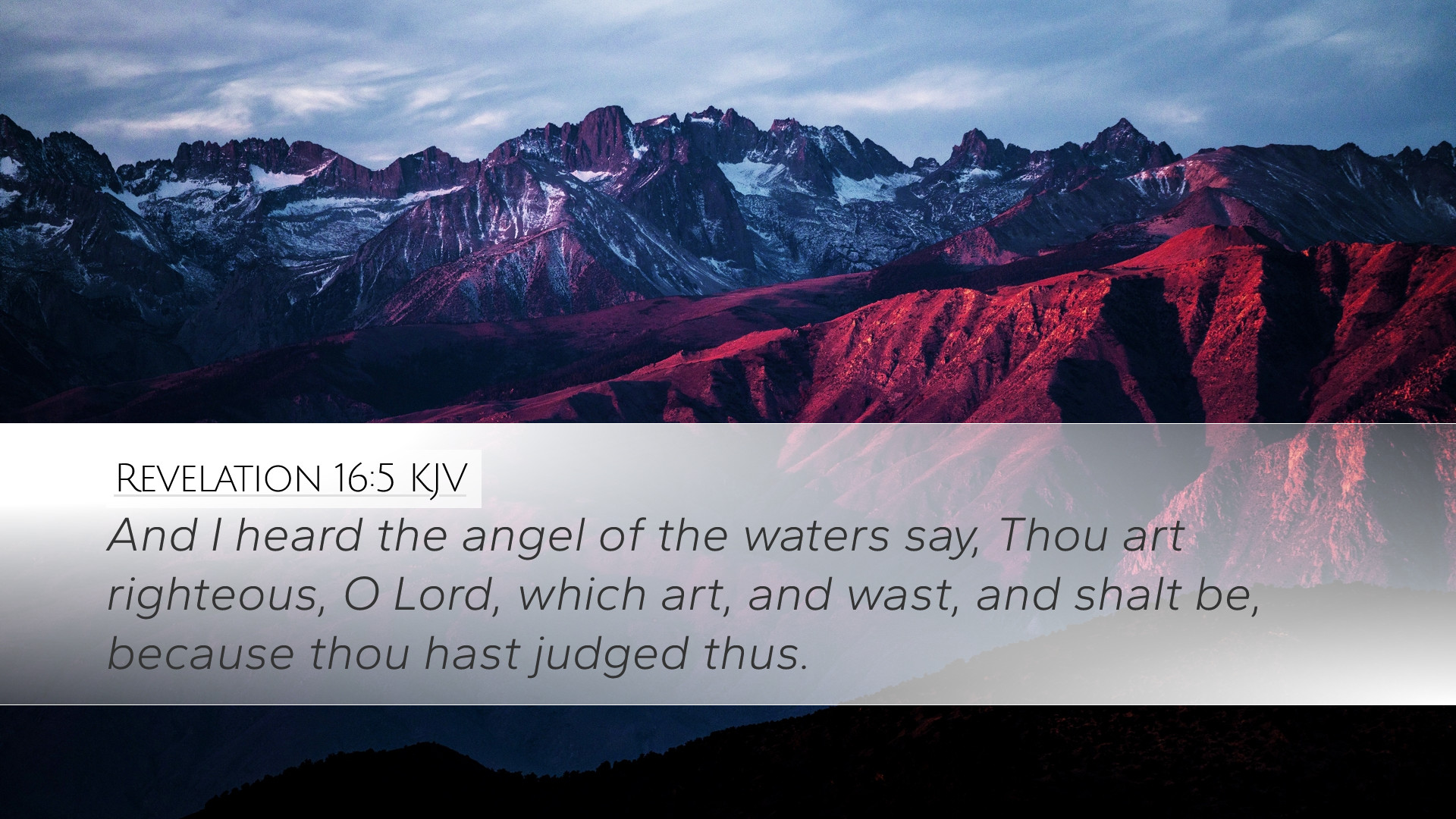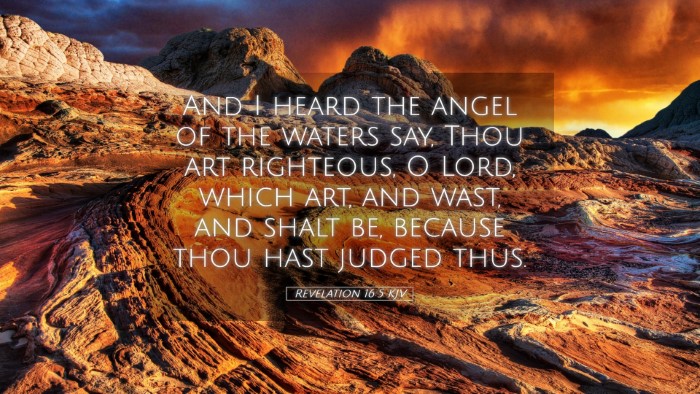Commentary on Revelation 16:5
Revelation 16:5 states, "And I heard the angel of the waters say: 'You are righteous, O Lord, the One who is and who was, and is to be, because You have judged these things.'" This verse is situated in the context of the bowl judgments, where God's righteous judgment is portrayed in its severity and necessity.
Understanding the Angel of the Waters
The mention of the angel of the waters is significant as it signifies God's sovereignty over creation, particularly over the natural elements. The waters symbolize not only physical waters but also the spiritual and moral realm. This angel is tasked with declaring God's righteousness pertaining to the judgment that has come upon the world.
Insights from Matthew Henry
Henry emphasizes the holiness and righteousness of God as the foundation of this declaration. He notes that the angel acknowledges God’s eternal nature—“who is and who was, and is to be.” This describes God's transcendence over time and His sovereign ability to enact justice throughout all ages.
Divine Justice Presented
- God's Nature: Henry highlights that the phrase “You are righteous, O Lord” encapsulates God’s essence. His judgments are not arbitrary; they stem from His inherent righteousness.
- The Judgments: The judgments being pronounced are a response to the sinful actions of humanity. As Henry notes, God’s judgment is always aligned with His justice—a reminder that sin inevitably leads to consequences.
Insights from Albert Barnes
Barnes provides a pastoral view on this verse. He stresses that this pronouncement from the angel is both a reminder of God's attributes and an assurance of hope amidst judgment.
The Hope Within Judgment
- The Righteousness of God: Barnes interprets the angel's declaration as a call for believers to remember God's faithfulness. Even in judgment, God remains just and true to His promises.
- The Necessity of Judgment: He argues that divine judgment serves to vindicate the righteousness of God's governance over the world. The declarations of judgment prompt humans toward repentance and a return to God.
Insights from Adam Clarke
Clarke provides a theological depth to the verse, drawing connections between Old Testament references and the New Testament understanding of God’s character.
Connecting the Old and New
- Eternal Nature of God: Clarke points out the continuity in God's character from the Old Testament to the New Testament. The acknowledgment of God's righteous character pertains throughout scripture and is made evident through His acts.
- Judgment as Affirmation of God’s Holiness: Clarke stresses that God’s judgments, as articulated by the angel, are declarations of His holiness and a reminder of the consequences of a life lived away from God.
Theological Implications
This verse also prompts believers to reflect on the nature of divine justice:
- God’s Sovereignty: The declaration from the angel underscores the view that all aspects of creation—including natural elements—are under God’s authority and utilized for His purposes.
- Understanding Judgment: It calls to mind the theological truth that God’s judgments, while severe, are righteous. They serve to reveal the consequences of human sinfulness and the need for divine grace.
- ESchatological Hope: There is an eschatological implication that emphasizes the eventual restoration and reconciliation that will come through Christ. This judgment leads to purification and a new creation.
Practical Applications
For pastors and scholars alike, Revelation 16:5 serves as a profound reminder of the balance between God's justice and His mercy:
- Encouraging Repentance: In preaching, this passage can be utilized to encourage congregants toward genuine repentance. It teaches that acknowledging God’s righteousness is crucial for understanding human sinfulness.
- Understanding God’s Nature: When teaching about God, emphasize that His actions—though sometimes harsh—are rooted in holiness and righteousness.
- Sustaining Hope: Conveying the assurance that God is ultimately in control and that His righteous judgment will pave the way for restoration is vital for both pastoral care and theological reflection.
Conclusion
In summary, Revelation 16:5 encapsulates a critical truth about God's nature—His judgment is a profound affirmation of His righteousness and holiness. As we delve into theological studies and practical applications derived from this verse, we recognize the duality of God's character as both judge and savior. Understanding His judgments encourages a posture of humility and repentance, leading to deeper communion with the Almighty.


